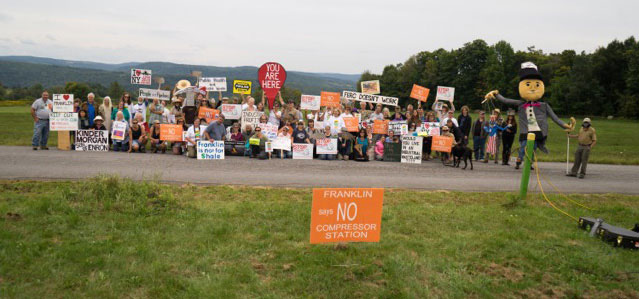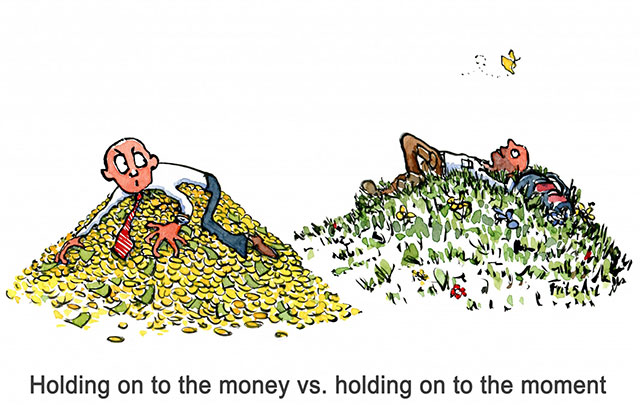What supporters of pipelines and compressor are missing…
Recently at a local town meeting, I presented a Pennsylvania report: Summary on Compressor Stations and Health Impacts (links to PDF file for download) *.
I mentioned some of its findings: compressors emit benzene and formaldehyde which are implicated, respectively, in childhood leukemia and asthma as well as in adult cancers. A member of the audience challenged me, saying that children were already dying of cancer even though we have no compressors. I’m not sure what her point was but I suspect she meant that there is a natural background level of kids getting cancer and asthma and that we opponents of compressors are just a bunch of nervous nellies standing in the way of progress and prosperity. Let’s ignore for the moment the possibility that we can do something about children getting cancer. Instead, let’s look at the purported economic benefits of the proposed gas infrastructure that supporters expect will follow along with the pipeline.
They are, I fear, going to be sadly disappointed. The Constitution Pipeline and the NED pipeline and its compressor stations that have so bitterly divided our communities are a big story in Franklin and neighboring communities but are really nothing but a footnote to a much bigger story with global implications. The new gas infrastructure is one small part of a desperate attempt to keep a party going that has already ended.

Ten years ago, global production of conventional oil peaked. Put that way, it sounds like a technical matter for the appropriate professionals to look after but, in fact, it should have been the biggest news of the last two hundred years. The Industrial Revolution that got rolling at the beginning of the 19th century was enabled by fossil fuels––first coal, then oil and gas. Until then, humans relied for energy upon their own muscles and those of domestic animals, all fed and fueled by the plants that harnessed the energy of the sun through photosynthesis. That, plus wind for sailing vessels and wind-mills, as well as water-mills, was the energy budget of life on earth. The annual cycle of seasons provided just so much energy and no more, so population and economic activity were held in check by physical limits.
Discovering and burning fossil fuels changed that. Very quickly the industrializing world learned to use not only the energy provided by the annual cycle but also the energy stored up in the earth for hundreds of millions of years. The complex, globalized, industrial world that we now inhabit is the result of two centuries of cheap and abundant energy supplied by first coal, then oil and gas. Burning those fuels transformed the world, giving enormous power to those who had or could acquire them. Today’s population is more than seven times greater than the one billion estimated to have been alive in 1800. In the industrial world, even the poor live in relative ease and comfort, compared to our ancestors. With little effort of their own, most people can keep warm, decently clothed and fed, thanks to the tremendous energy content of fossil fuels. Everything about our daily lives and the infrastructure that supports us is dependent upon readily available supplies of cheap and abundant fuel, especially oil.
Fossil fuels also introduced a new concept: economic growth. Before the Industrial Revolution, the only way for an economy to grow was by warfare––by invading another country and stealing their stuff. Think of the Roman Empire or the British and Spanish Empires. The victor’s economy would grow but the defeated would be ruined. With the advent of fossil fuels, however, economies could be made to grow by increasing the use of energy. And oil, the main source of energy, was easy to come by. Unhappily, we humans are not very good at looking ahead: in the exuberant and expansive race for wealth that has marked the industrial period, we forgot that we live on a finite planet with only so much stuff on it––including coal, oil and gas.
The year 2005 marked the peak of global production of what is called conventional oil, the classic “black gold” of Pennsylvania, Texas, Oklahoma, Russia, and the Middle East. That oil was on-shore, close to the surface, relatively cheap and easy to get out of the ground. Instead of recognizing that the peak of conventional oil was a turning point in our civilization, governments and oil companies began a frenzied search for ever more remote, expensive, technically challenging and more polluting sources of fuel, including deep sea drilling, fracking for oil and gas, mountain-top removal, and tar sands.
After the peak, it was no longer possible to generate economic growth simply by increasing the supply of energy. Starting in 1970, when U.S. conventional oil production peaked, governments, corporations, and individuals began to substitute debt for growth. Everyone borrowed: Wall Street invented financial instruments to create ever more fictitious money, governments racked up enormous deficits, individuals lived beyond their means with credit cards and home refinancing, the Fed blew one bubble after another in high tech, then housing, and fracked oil and gas, as our economy was increasingly turned into the fraudulent casino it is today.
Drillers used to shove a pipe in the ground and out flowed abundant oil or gas. Today, they must spend millions on rigs to drill down miles, then drill horizontally and then blow up layers of rock to release the fuels. All that costs a lot of money and a lot of energy. And fracked gas wells (like those in the Marcellus Shale that would provide the gas to fill the Constitution and TGP pipelines) deplete very rapidly; instead of producing abundant gas for years as conventional wells do, fracked wells produce lots of gas for a few months and then rapidly fall off, so that the companies must drill many wells (at great cost) to keep up production. Because many drillers have been losing money on their gas for years, they have been borrowing millions in the junk bond market at low rates courtesy of the Federal Reserve’s zero-interest-rate-policy.
The financial frauds of the housing bubble nearly brought down the world economy in 2008. Our government bailed out the big banks whose gambling caused the disaster and left the rest of us on the hook for their debts. Then the Fed blew new bubbles, this time in extreme energy. Companies bought leases, drilled wells, pumped oil and gas only to find that the customers don’t have any money because all the good jobs have been shipped overseas. Drillers in the Marcellus Shale need about $6/mcf to break even. Today, the price is $2.50, so they drill faster to keep production up to pay the interest on their debts, while the increased production drives the price ever lower. One day soon markets are going to recognize that a bunch of Ponzi schemers paying each other bonuses is not a sound way to run an economy, and something very bad is going to happen.
The Constitution Pipeline is part of this massive international financial fraud. The export markets it is supposed to serve in Europe and Asia are all rapidly falling on hard times but, as long as CP and Kinder-Morgan can keep fooling new investors, they will continue the charade. They may never ship gas but they will do as much damage as they can for as long as they can – to land that does not belong to them.
The saddest part of this story is the bitter division in communities like Franklin along the pipeline, sad because the energy decline that is surely coming will bring our economy very low and we shall all need each other’s help and cooperation as never before to maintain a decent, civilized, healthy life. It is a deep and sorrowful pity that, at this very moment, our communities have so painfully fractured.
When the drillers blasted the rock so far beneath the surface, they released not only a temporary flush of gas, but also demons of discord and dissension.
* Summary on Compressor Stations and Health Impacts, February 24, 2015, www.environmentalhealthproject.org

